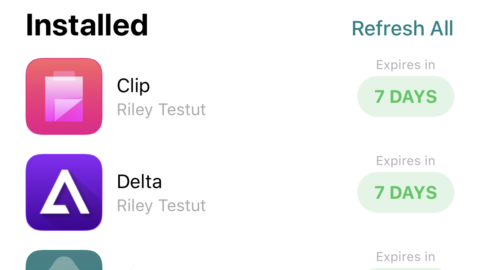It’s time Apple let you install any app you like on the phone you own
During the iPhone’s earliest days, the only official apps were preloaded by Apple. For everything else, you had to use web apps. Devs weren’t convinced – web apps felt second class. Various solutions to ‘jailbreak’ your iPhone and sideload native apps swiftly appeared.
The timeline of what happened next is unclear, but we do know the then Apple SVP of Software Engineering, Bertrand Serlet, sent Steve Jobs an email, outlining the framework for what would become the iPhone SDK and the App Store.
However, because of Apple’s desire for control and its emphasis on security, things never moved on from 2008. There’s still no official way to add apps from outside of the App Store, with the exception of web apps. But things might be about to change. New EU directives and pressure from the US government could force Apple’s hand. And even though Apple’s stance hasn’t budged from its scaremongering 2021 threat analysis of sideloading, it might have no choice other than to (grudgingly) unlock the capability for iPhones later this year.
But who’s right here? Is sideloading a danger to iPhone users, a benefit, or perhaps both? Someone who knows this space is Riley Testut, creator of AltStore, a native app that ‘tricks’ your iPhone into installing apps it thinks you made. We interviewed Riley, to get his thoughts on sideloading, why he made AltStore, and where Apple might head next.

AltStore for iPhone.
Why might someone want to sideload an app? Isn’t there always ‘an app for that’ on the App Store?
Riley: Not necessarily. Several types of apps aren’t allowed, including video game emulators, virtual machines, web browsers with their own rendering engines, and iPod recreations. Apple also sometimes removes apps for political reasons – such as HKmap.live at the request of the Chinese government during the 2019 Hong Kong protests. Sideloading allows these apps to exist in some way, for those who really want them.
Why did you create AltStore?
At WWDC 2015, I asked Apple how it might approve my Nintendo emulator, Delta, and was told I’d have to limit it to an ‘allowlist’ of games that could be individually reviewed. A year later, I’d made significant progress, but was then told Apple “can’t allow emulators” at all.
I didn’t want to throw away my hard work, so started researching other ways to distribute Delta. Apple had made it possible for students to test their apps with Xcode, and so I built a distribution method based on this functionality – but for everyone.
It’s worth noting everything AltStore does is explicitly supported by Apple. It doesn’t rely on exploits or unintended behavior, which lowers the risk of an iOS update breaking things.

Delta for iPhone, playing free NES game Alter Ego.
Are there any ‘gotchas’ with current sideloading for iPhone?
So many! Apple went to great lengths to prevent people from doing it and so the process is cumbersome. Sideloaded apps ‘expire’ after seven days. You can only install three (including AltStore). You can’t sideload more than 10 in a rolling seven-day period. And you need a computer to sideload apps. AltStore can refresh apps in the background, to deal with the seven-day limit, but there’s little more it can do to further streamline things.
What do you think about Apple’s stance that sideloading and alternative App Stores are a bad thing for users?
I think Apple’s right about alternative apps stores. Many people choose iOS for its curated, console-like experience. Having a single App Store they can trust plays a large part in that. Allowing third-party stores would disrupt the ecosystem, because each one would poach apps to have its own exclusives. So users wouldn’t really get more choice – they’d have to use third-party stores to keep their favorite apps, or risk losing them.
However, Apple could add sideloading in a way that adds enough friction to dissuade the average consumer. This would stop existing apps from leaving the App Store, minimizing disruption and not affecting customers who’ve no interest in installing non-App Store apps. But it would finally allow apps like Delta to officially exist.

Getting AltServer running is convoluted. Official sideloading might not be any easier.
How do you think Apple will approach official sideloading if its hand is forced by the EU?
The Netherlands last year introduced a law that ensured dating apps could use external payments. Apple’s response was to demand those apps pay Apple 27% of any such payments, and thereby retain its cut. Similarly, I fully expect with sideloading Apple will do everything it can to minimize disruption to its income and user experience.
It will comply with the law, but in the most inconvenient way possible. But again, I believe allowing ‘restricted’ official sideloading is OK – and less of a threat to the App Store ecosystem than alternative app stores.
If Apple did allow sideloading, how would this affect AltStore?
Ultimately, the AltStore vision is to co-exist with the App Store and become the place to find cool, quirky apps that wouldn’t be approved by Apple. No matter what Apple does, we’ll adapt however we can to accomplish that goal.
In a sideloading world, AltStore could serve as a convenience layer over restrictions Apple places on sideloading, and help consumers discover new apps. For developers, it’d be an easy way to distribute apps through a digital ‘store’ without dealing with app review.
Find out more about AltStore at altstore.io or read our guide to getting started to try it yourself.

